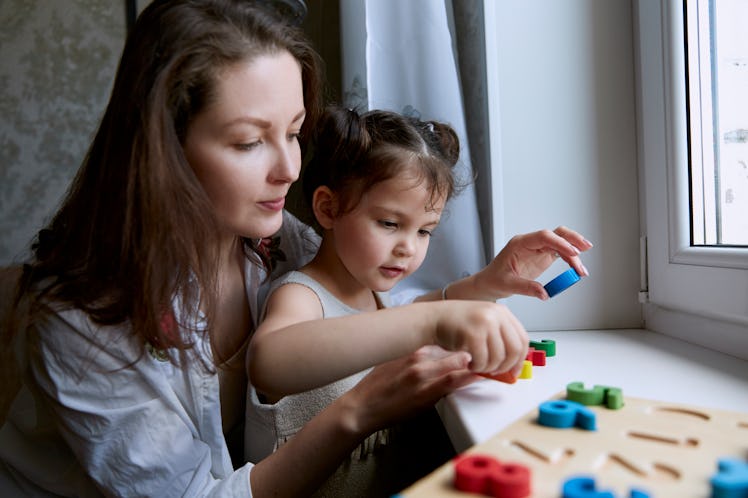The Skills A Child Really Needs Before Starting Kindergarten
Forget the ABC song and counting to 100 for no reason; a kid needs context before Kindergarten.

A preschooler who knows their ABCs from the alphabet song is adorable. A 4-year-old who can count accurately to 100 is pretty impressive. But neither of those kids actually have skills that are particularly useful for Kindergarten, or life. Yes, that sounds harsh, but there are reasons for that assessment: The list of skills children need to succeed in Kindergarten is relatively short and doesn’t include rote memorization.
One of the reasons an alphabet and centenary of numbers is not necessarily helpful is because every kid will come into Kindergarten with wildly different levels of knowledge based on where they went to pre-K. So whether they’re academically a little ahead or a little behind, everyone’s going to know their letters, numbers, and colors by the time they head towards the numbered grades.
Another reason the memorization of digits, letters, animal names or state capitals makes no difference in Kindergarten is because knowledge doesn’t count for much without context. Just because a 5-year-old knows the capital of Vermont doesn’t mean that he or she understands Montpelier’s historical significance or demographics (or needs to). In fact, a seemingly impressive kid may be behind if they don’t know numbers can aid in a transaction or that letters create a book.
“The first five years of a child’s life should be experiential,” explains family therapist and former Kindergarten teacher Kathryn Smerling, Ph.D. “That experience should have to do with what’s going on in their world, and learning how to function in the world. It’s not an abstract stage of life: It’s a very concrete stage of life.”
The alphabet song is fine. But it’s more important that a child be able to recognize that the alphabet is made up of letters, and that letters form words, and that those words can create stories. This is one of the reasons parents reading with kids is such a key to literacy. To help things along, Smerling encourages parents to point out words, whether they be in the pages of a book or on business signs on Main Street.
Context is key for numbers as well. “I think kids should know how to recognize money, because that’s an exchange,” Smerling explains. “Things are valued in our society. We pay for things with money identified by numbers.”
To foster this idea, she suggests parents collect pennies with their kid, counting them and exchanging them for other coins or treats. The same concept can be accomplished by collecting marbles in a jar, one for every time a child does something right. Eventually, the marbles can be tallied and exchanged for a treat or a toy. It all shows the power of numbers in context.
“All of this is functional,” Smerling says. “It’s making a child able to function.”
Context is also important for the social and emotional skills children need to know before heading into Kindergarten. It’s one thing to tell a child that when they get into Kindergarten they need to pay attention, listen to the teacher, and behave themselves. But it’s better still that they come to an understanding of why these things are important in their own home with the adults that are already in their lives.
That’s why it’s important for parents to have some disciplinary standards and model good social transactions. That means that if parents want their kid to understand the value of resilience, manners, and rule-following, they too need to say ‘please’ and ‘thank you,’ react calmly to failure and stress, and be consistent with rules while also paying attention to their child.
“You have to validate a child and also listen to what they’re saying,” Smerling explains. “You have to speak to them on their level, not on your level as a grown-up.”
Beyond knowing the alphabet and counting high, kids don’t need to have much more than a willingness to engage intellectually, emotionally, and probably physically with the world. Smerling notes that it makes no difference if the kid is popular with other kids. It makes no difference if they happen to be a bit shorter. These are an example of traits tied to the developmental processes that happen in fits and starts throughout a child’s life. It essentially all comes out in the wash.
However, Smerling is quick to point out that parents who feel there is a problem when their kid hits Kindergarten should do something quickly — no need to worry about overreacting. “Get help,” she says. “Doing an intervention before the age of 5 has really long-lasting effects.”
This article was originally published on